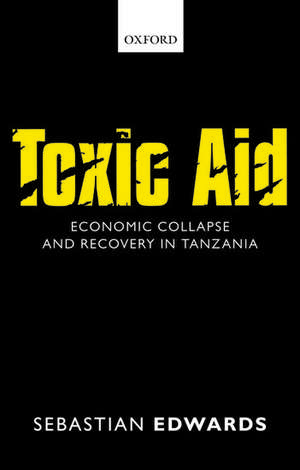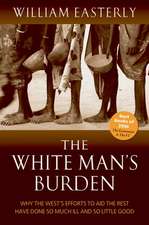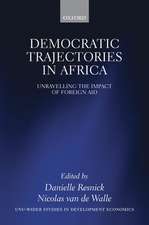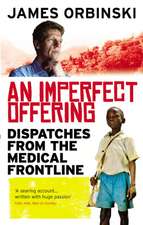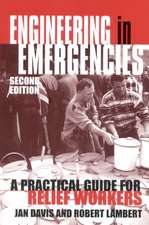Toxic Aid: Economic Collapse and Recovery in Tanzania
Autor Sebastian Edwardsen Limba Engleză Paperback – 28 iun 2018
| Toate formatele și edițiile | Preț | Express |
|---|---|---|
| Paperback (1) | 166.36 lei 31-37 zile | |
| OUP OXFORD – 28 iun 2018 | 166.36 lei 31-37 zile | |
| Hardback (1) | 491.84 lei 31-37 zile | |
| Oxford University Press – 24 apr 2014 | 491.84 lei 31-37 zile |
Preț: 166.36 lei
Preț vechi: 202.98 lei
-18% Nou
Puncte Express: 250
Preț estimativ în valută:
31.84€ • 34.60$ • 26.77£
31.84€ • 34.60$ • 26.77£
Carte tipărită la comandă
Livrare economică 10-16 aprilie
Preluare comenzi: 021 569.72.76
Specificații
ISBN-13: 9780198825524
ISBN-10: 0198825528
Pagini: 316
Ilustrații: 6 Figures, 17 Tables
Dimensiuni: 136 x 216 x 23 mm
Greutate: 0.36 kg
Editura: OUP OXFORD
Colecția OUP Oxford
Locul publicării:Oxford, United Kingdom
ISBN-10: 0198825528
Pagini: 316
Ilustrații: 6 Figures, 17 Tables
Dimensiuni: 136 x 216 x 23 mm
Greutate: 0.36 kg
Editura: OUP OXFORD
Colecția OUP Oxford
Locul publicării:Oxford, United Kingdom
Recenzii
Opposing sides on foreign aid fiercely debate whether it spurs growth or actually does harm. Sebastian Edwards' fascinating tale of aid in Tanzania suggests it can do both. He reminds us that the more recent success of aid and reform in Tanzania is undoing the disaster caused by aid's decades-long support of domestic tyranny and corruption. A must-read for both sides of the aid debate, or for all those who simply care about poverty.
Brilliant analysis from one of our leading thinkers on economic development. Edwards places the experience of Tanzania in the broader and continuing debate about the effectiveness of foreign aid. His sober and thorough dissection of the historical record leads to a powerful conclusion: the international assistance provided from 1961 to 1981 proved highly toxic, but outside support subsequently became more constructive. This controversial volume will become a must read for anyone concerned with prosperity and stability around the world.
Tanzanian economic policies resulted in a disaster of monumental proportions, aided and supported by most of the foreign aid community through the first several decades. Edwards provides an excellent insightful, balanced, and well-documented analysis of the economy's implosion, its turnaround in policies and performance, and the role foreign aid providers played in the debacle and the recovery. This first-rate book should be required reading for all those interested in development policies and African economic development. It also provides an invaluable overview for those non-specialists wanting to learn more about the Tanzanian experience.
In this compelling and highly readable account of the Tanzanian experience, Sebastian Edwards exposes the facile debate over the question of whether foreign aid is harmful or beneficial. By distinguishing the approaches that have worked from those that have failed, Edwards demonstrates convincingly that the question cannot be answered unconditionally. This book should be required reading for all those interested how foreign aid can be used to achieve positive outcomes.
This book is a must-read for anyone interested in African economic development. Sebastian Edwards is an exciting new voice in the debate on foreign aid in Africa, and expertly uses the case of Tanzania to shed light on the good - and the bad - that aid can do. Employing the latest statistics, and drawing on his own extensive first-hand experience advising the Tanzanian government, Edwards weaves an engaging tale of failure and redemption in one of Africa's most intriguing nations. I look forward to recommending this book to my friends, colleagues, and students alike.
This engagingly written analytical narrative fills a gap in the literature on development. It goes inside a country that has experienced failure (Tanzania 1961-1981) and, plausibly, success (1996 to today). Edwards' valuable interpretation of this case exploits his vast experience and his mastery of the scholarly literature. Regarding the controversy over does foreign aid work? he shows how the answer depends on the policies and probity of the countrys leaders.
In Tanzania global academic fashions have been atypically influential with both donors and governments. The resulting roller coaster is splendidly dissected in this important book.
Does foreign aid really help developing countries to develop? Or does it stand in the way of development by enabling corrupt and repressive regimes that pursue inappropriate economic policies? Sebastian Edwards' important volume on Tanzania provides compelling answers. With carefully marshalled economic data, Edwards shows that foreign aid may have been a critical factor in enabling the government of Tanzania to pursue economically ruinous economic policies during the two decades following independence. Beginning in the early 1980s, however, pressure from the foreign aid community was at least equally important in convincing Tanzania to undertake needed and beneficial economic reforms and in providing resources to carry out these reforms.
Brilliant analysis from one of our leading thinkers on economic development. Edwards places the experience of Tanzania in the broader and continuing debate about the effectiveness of foreign aid. His sober and thorough dissection of the historical record leads to a powerful conclusion: the international assistance provided from 1961 to 1981 proved highly toxic, but outside support subsequently became more constructive. This controversial volume will become a must read for anyone concerned with prosperity and stability around the world.
Tanzanian economic policies resulted in a disaster of monumental proportions, aided and supported by most of the foreign aid community through the first several decades. Edwards provides an excellent insightful, balanced, and well-documented analysis of the economy's implosion, its turnaround in policies and performance, and the role foreign aid providers played in the debacle and the recovery. This first-rate book should be required reading for all those interested in development policies and African economic development. It also provides an invaluable overview for those non-specialists wanting to learn more about the Tanzanian experience.
In this compelling and highly readable account of the Tanzanian experience, Sebastian Edwards exposes the facile debate over the question of whether foreign aid is harmful or beneficial. By distinguishing the approaches that have worked from those that have failed, Edwards demonstrates convincingly that the question cannot be answered unconditionally. This book should be required reading for all those interested how foreign aid can be used to achieve positive outcomes.
This book is a must-read for anyone interested in African economic development. Sebastian Edwards is an exciting new voice in the debate on foreign aid in Africa, and expertly uses the case of Tanzania to shed light on the good - and the bad - that aid can do. Employing the latest statistics, and drawing on his own extensive first-hand experience advising the Tanzanian government, Edwards weaves an engaging tale of failure and redemption in one of Africa's most intriguing nations. I look forward to recommending this book to my friends, colleagues, and students alike.
This engagingly written analytical narrative fills a gap in the literature on development. It goes inside a country that has experienced failure (Tanzania 1961-1981) and, plausibly, success (1996 to today). Edwards' valuable interpretation of this case exploits his vast experience and his mastery of the scholarly literature. Regarding the controversy over does foreign aid work? he shows how the answer depends on the policies and probity of the countrys leaders.
In Tanzania global academic fashions have been atypically influential with both donors and governments. The resulting roller coaster is splendidly dissected in this important book.
Does foreign aid really help developing countries to develop? Or does it stand in the way of development by enabling corrupt and repressive regimes that pursue inappropriate economic policies? Sebastian Edwards' important volume on Tanzania provides compelling answers. With carefully marshalled economic data, Edwards shows that foreign aid may have been a critical factor in enabling the government of Tanzania to pursue economically ruinous economic policies during the two decades following independence. Beginning in the early 1980s, however, pressure from the foreign aid community was at least equally important in convincing Tanzania to undertake needed and beneficial economic reforms and in providing resources to carry out these reforms.
Notă biografică
Sebastian Edwards is the Henry Ford II Professor of International Economics at the University of California, Los Angeles, and a Research Associate at the National Bureau of Economic Research.
